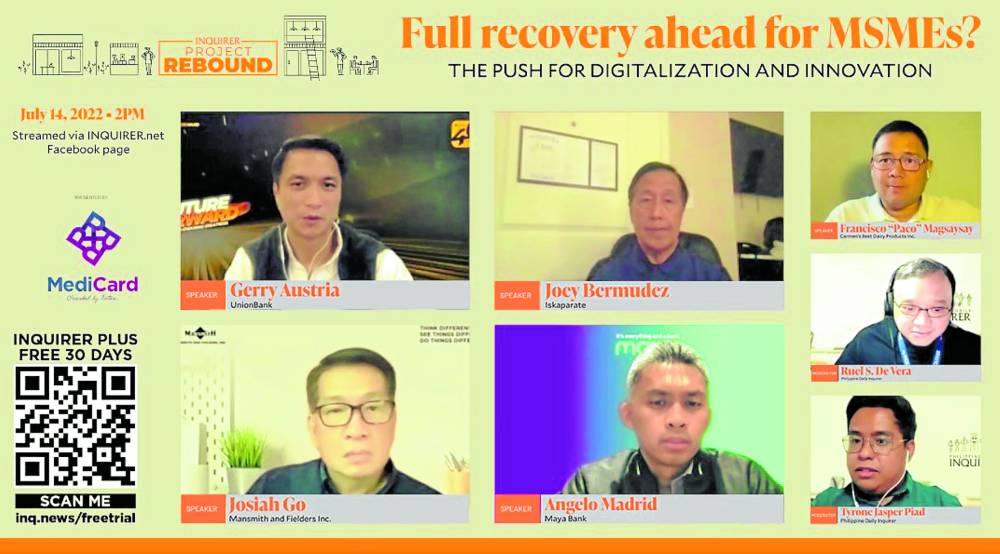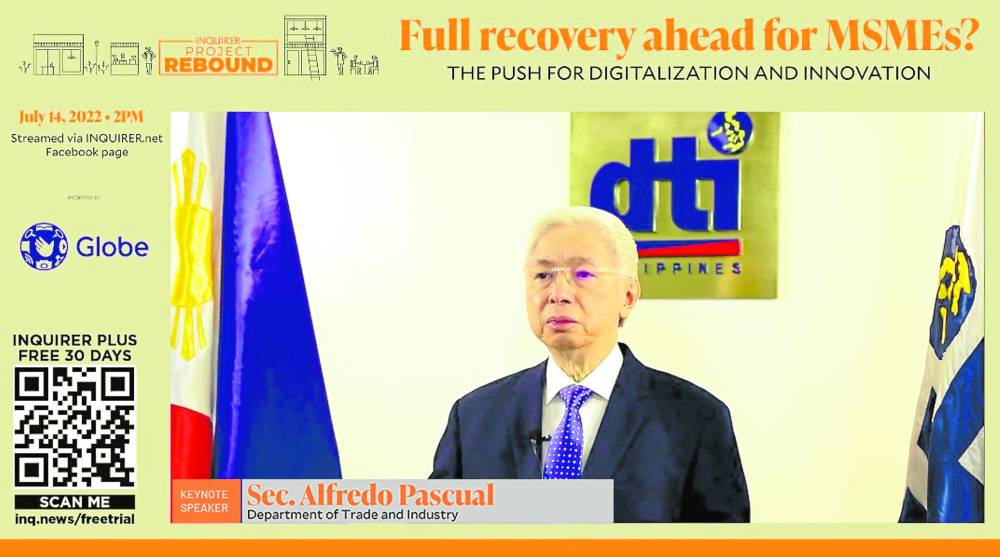Digital is the new guard
.
Digital is increasingly becoming the name of the game. From television channels entering into the streaming service fight to daily broadsheets getting their own apps, more and more industries have realized that the new business battleground is our devices.
As Forbes stated in 2021: “An entirely new game is being played. In this new game, innovation can transform almost any product and disrupt the dynamic of industrial-era competition.”
Chances are, in the past hour alone, you’ve scrolled through your favorite shopping app and added multiple items to your cart, ordered food from a food delivery app, and paid for both through mobile banking.
It’s tempting to pinpoint the COVID-19 pandemic as the sole reason for this shift to digital, with it driving the new premium to being as contact-less as possible. However, while it certainly accelerated this, the economy was already making its way to digitalization.
Article continues after this advertisement“Even before the onset of the pandemic in 2020, industries have already been looking to utilize connectivity digital technologies to enhance their operations. COVID-19 just enhanced the country’s digital transformation process,” said country representative for United Nations Industrial Development Organization (UNIDO) Teddy Monroy during the Inquirer Project Rebound’s webinar on digitalization and innovation.
Article continues after this advertisementIndustry 4.0
We are in the fourth industrial revolution. Taking off from the third revolution, which focused primarily on the introduction of digital technologies and automation, Industry 4.0 is focused on cyber physical systems.
“Industry 4.0 capabilities such as big data, internet of things, artificial intelligence, blockchain, and additive manufacturing demonstrate data access and transfer that is conducted decentrally, allowing computers and smart machines to interact with one another, ultimately making decisions without human involvement leading to higher levels of autonomy and capability for self-cognition, self-optimization, and self-customization,” explained Monroy.
He noted that to remain competitive in the digital age, businesses, especially MSMEs, will need to go beyond the minimum of adding e-commerce and having an online presence and remote work options to their practices, but to actually get involve in Industry 4.0.
“These technologies take advantage of the convergence of information technology and operational technology allowing for increased productivity, efficiency, value-creation, and opportunities to occupying niches in the market that may not have been filled up by the big players.”
Trade and Industry Secretary Alfred E. Pascual also stressed the need for digitalization in his keynote speech that the government agency sees “that MSMEs operate in an increasingly digital world characterized by rapid technological change, with “sixty million new digital customers in the Southeast Asian region since the outbreak of COVID-19 in early 2020.”
However, he also pointed out that many MSMEs have not yet fully integrated digital solutions. “In a 2020 baseline survey of digitalization of MSMEs in the Philippines, DTI found that most MSMEs still need to build their capacity to digitalize their operations,” and noted that because of this, the agency has been promoting e-commerce partnerships with the private sector.
Gerry Austria of UnionBank echoed this sentiment. “Not all MSMEs are comfortable with digital technologies,” he said, explaining that a lot of the discomfort was down to lack of readily- available information. “Not all MSMEs have access to these resources. Hindi nila alam ang search engine optimization (SEO). Some [don’t] even have a Facebook account. Importante ang education ng MSMEs. That’s where we from the private sector can help as well.”
Innovation
Many businesses have stepped up to the plate to help their fellow business owners. One such business is the online learning platform and marketing consultant Mansmith and Fielders.
Its chairman Josiah Go said that the company started offering affordable video business courses “for the price of a book” to help teach MSMEs how to navigate their way to success.
“We noticed that many small entrepreneurs, their goal is to be entrepreneurs. But what’s the pain point? It’s really about scaling. Their business model is not geared towards the company they’re growing. They don’t know that they have to keep on growing and also manage their costs. It’s not very clear to them that they have to do that.” “We’re very proud to be a contributor in the MSME community.”
Iskaparate founder Joey Bermudez also spoke about how he innovated his digital platform to cater to the needs of the micro entrepreneur, noting that it stemmed from his company noticing that their clients were slowly “dying” and needed to “participate in the digital supply chain.”
“We realized that there were a lot of pain points that were preventing micro entrepreneur from being present in online marketplaces. We asked ourselves, if the existing online marketplaces were really that good and they were really that suitable for micro entrepreneur, why aren’t the micro entrepreneur in these places? Why aren’t they in these platforms? We found a lot of pain that we had to solve in the process. So iskaparate.com evolved from just being a digital platform to an assistant platform which included capacity building, micro-finance, and the provision of the most basic services that would enable a person to participate meaningfully in digitalization,” he said.
Innovations like Iskaparate aren’t just helping fellow business owners, it also revitalized their own business as well. Bermudez noted that the company itself was at the “risk of dying and closing down.”
But of course, innovation in the modern age doesn’t only refer to going digital. Coming up with creative solutions to deal with problems, or in the case of Carmen’s Best Dairy Products, maximize their efficiencies. During the pandemic, the company started an affordable version of their ice creams, called Arctic, using the same routes and services.
Company chief executive officer Francisco “Paco” Magsaysay said “they started a community reseller program where we were looking for people to sell in the different villages and even apartments complexes they lived in.”
This helped people become their own MSMEs in their own neighborhoods as well as solved the companies’ own struggle with selling their products during the lockdown—when citizens were not allowed to leave their own communities. It also allowed the company to have a bigger reach, with the products being sold as far away as Kidapawan in Cotabato.
Digital banking
Digital banking services such as UnionBank and Maya Bank are also making sure that they make the shift to digital as painless as possible for MSMEs.
Austria noted that it was imperative for MSMEs to go digital. “Kung dati, everything is inside the mall, now i don’t even have to go inside the mall to do my shopping. I just turn on my Facebook account, and daming mga nag-oonline selling. PM is key, diba?”
He added, “most of the time, we are on our mobile phones or devices. Mga kasama niyo sa bahay, maids, mga kids, lahat yan nasa device nakatutok most of the time. Kaya if you’re not on the device, you’re not on those pages, if you’re not on a website or Instagram or Facebook, you are really missing out on a lot.”
However, he noted that digital payment processes can often be tedious, describing how coursing payments through bank transfers involve multiple steps for both customer and seller. However, payment innovations like QR code payments eliminate this hassle.
Angelo Madrid of Maya Bank, meanwhile, noted that aside from making payments easy, with digital banking platforms can make services like money transfers more accessible. He used the story of Nabal Capong, a student from Buldon, Maguindanao. As the town was in a remote area, money transfer areas were hard to reach. Capong’s parents would have to travel for two hours to reach the nearest banks and money remittance centers to send him his allowance. Aside from that, they would have to shell out P200 for the transportation alone.
He highlighted Capong’s and similar stories as to how payment platforms can truly positively affect consumers. He also pointed out that tools like verifying online sellers can also help customers. It “digitizes trust” and gives them ease of mind in purchasing products.
The road ahead
Of course, it’s important to note that while there have been many great innovations done by the private sector, there’s still a long and bumpy road ahead with financial projections due to issues like the Russia and Ukraine crisis looking grim.
“With the economy that doesn’t seem so promising in the next months and even couple of years. Energy prices are so high. Everything is just going up,” said Magsaysay.
This isn’t a message for small business owners to despair or give up, but to be prepared.
“It’s important to adjust the targets to have a more realistic view of the next several months or even couple of years. I think it’s important to tighten our belts and maximize our efficiencies,” he said.

